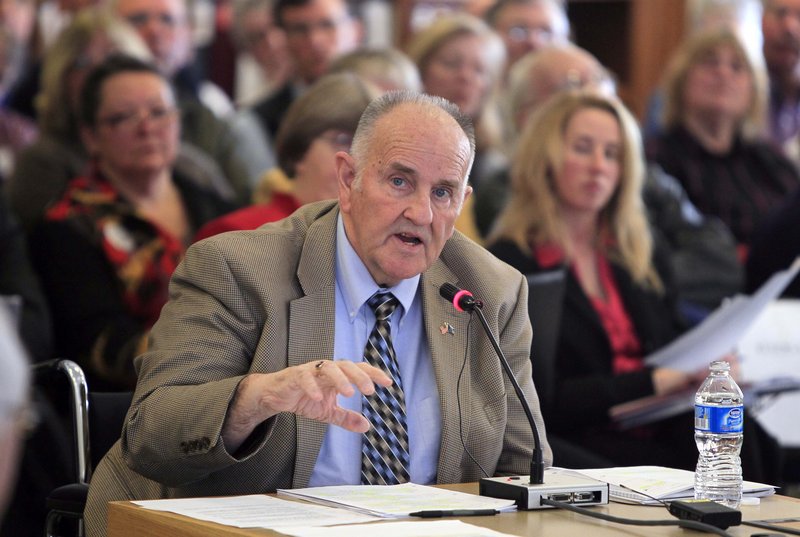AUGUSTA – You might expect Sawin Millett, a self-described baseball addict and lifelong Mainer, to be a diehard Red Sox fan.
Yet truth be told, since the 1946 World Series, when St. Louis beat Boston four games to three, he’s loved the Cardinals.
“I guess I was searching for a role model or a hero,” he said. “I was so impressed with the way Stan Musial not only performed on the field, but conducted himself. He was an absolute gentleman.”
So is Millett, according to those who have worked with him through the years.
“The best way I can describe Sawin is a real patriot in the most honorable sense of the word,” said Sen. Richard Rosen, R-Bucksport, chairman of the Appropriations Committee. “He truly believes in public service and he really has dedicated his skill, energy and enthusiasm to do everything he can to improve conditions in the state of Maine.”
Millett, 73, earned unanimous approval in January from the state Senate to serve as commissioner of the state Department of Administrative and Financial Services. Key Democrats and Republicans spoke on his behalf at his confirmation hearing, a day when he was in so much pain from an infection following knee replacement surgery he could barely stand.
And while all Cabinet members play an important role in running state government, it’s not a stretch to say Millett — who has served three previous governors in various roles — is the cornerstone to helping LePage reach his goals.
“Having served five years on this floor creating the department, knowing the players, having a strong interest in budget, I knew this was a natural fit for me,” he said during a recent interview in the Cross State Office Building.
Until the November election, Millett was hoping to continue his legislative career as he attempted to switch from the House to the Senate. But he lost his Senate District 14 race to Democrat John Patrick.
LePage then quickly contacted Millett to gauge his interest in serving in the Cabinet.
Since then, he’s been the public face of the $6.1 billion, two-year budget, a controversial proposal that has angered state workers and teachers because of proposed pension reforms. It’s also raised concern among public health supporters because of proposed cuts to drug-treatment programs and home-visitation programs for young mothers.
Through it all, Millett has remained unflappable as he’s fielded questions from lawmakers or taken criticism from affected groups.
Millett credits his parents, particularly his father, with instilling in him a sense of duty when it comes to public service.
His dad, Howard S. Millett, was a teacher, principal and superintendent of schools, while his mother, Marguerite, was primarily a homemaker who also worked as a secretary for superintendents. Millett is the second oldest of five boys, all of whom helped out on the family dairy farm before heading to school each day.
After moving a few times as his dad changed jobs, the family settled in Dixmont when Millett was in fourth grade. They had a dairy farm that at one point grew to 60 cows.
“The five boys really grew up on the farm,” he said. “We had a great life. All finished high school in the area, all went on to college.”
Millett graduated from Carmel High School in 1955, a school that later closed. After high school, he went to Bates College, following in his mother’s and father’s footsteps.
After a few years of teaching math and science at his old high school and one year at Hermon High School, he was chosen to be a district-wide supervisor for a new junior high school program. It involved building a new school and Millett stayed in the system until 1971.
“I took a lot of my career-goal setting from my dad,” he said. “I wanted to get involved in town government. I wanted to get involved in administration.”
His dad also fueled his interest in the Legislature, having wanted to run but never getting the chance. His son first served in the Legislature from 1969-1972.
Millett also moved up in the education field, serving as the first executive director of the Maine School Management Association. That led him to become commissioner of education for Gov. Jim Longley, an independent who served from 1975-1979. It was a chance for Millett, who was in his late 30s when he was appointed, to get an insider’s view of how government works.
“It was a fascinating opportunity for a young person to grow up and assume responsibility of a major proportion, working for a man who was really very aggressive, hard-driving, a high-expectations governor,” he said. “Yet I couldn’t be happier with the way he treated me, even though I know his expectations were high and the demands were great.”
During that time, Millett moved his family to a suburban subdivision in Manchester to cut down on his commuting time. It was the first time he’d lived in a housing development, and he didn’t like it.
His parents had retired to Waterford, so Millett and his wife, Barbara — who were high school sweethearts — bought 25 acres adjacent to his parents’ farm and built a house in 1977.
He still does all of his own haying and wood cutting, getting some help from his four surviving children and from his grandchildren.
“For me, it was a respite or a relief to get away from the pressures of Augusta,” he said. “I made a commitment way back to always go home at night. When you have a weekend or you have a little time to get outdoors and experience rural life, it is quite a refreshing break from an Augusta job.”
In 1989, Millett came back to state service as commissioner of the state finance department under Republican Gov. John McKernan. It was a time of fiscal turmoil and state shutdown, a situation he describes as worse than the state’s present financial situation.
Still, he’s concerned that the state has had continual budget problems since 2002.
“One of my hopes is the structural approach this governor has taken will move us to a point when the next biennial budget is put together, we won’t have a structural gap,” he said. “We’ll start to make targeted investments in the long term.”
From 1995 to 2000, Millett worked for the state’s second independent governor — Angus King — as associate commissioner of the Department of Mental Health/Mental Retardation and Substance Abuse Services.
It was in this capacity that he worked closely with Charlene Kinnelly and other members of the Maine Association for Community Service Providers.
“Sawin is truly a treasure for the state and we are delighted that he has this opportunity to continue to contribute,” she told lawmakers at his confirmation hearing. “Maine can only be better because of his involvement.”
In 2002, Millett was elected to the Maine House, where he served eight years, which included time on the Appropriations Committee. Facing term limits, he tried a run for the Senate, but lost to Patrick, another State House veteran, 53 percent to 43 percent.
Before his state Senate loss last fall, Millett’s right knee had developed its first infection after replacement surgery.
Later in January, shortly after he was sworn in to his new job, he missed a few weeks of work because of a second infection. During that time, Ryan Low, a Democrat who served as finance commissioner for Gov. John Baldacci, filled in for Millett.
“I would do just about anything for him,” Low said. “There’s no one more of an expert on budgeting and legislative process, but even more than that, he’s a genuinely nice person.”
Later this month, Millett, who’s been in a wheelchair since January, goes back into surgery to replace the knee replacement.
It’s been frustrating for the former jock, who played baseball and later softball, into his 60s.
“I have to have help doing just about everything,” he said.
Yet he’s hopeful that his next surgery will involve a much speedier recovery. He’s told LePage he’ll work for four years, but made no promises after that.
Back home on the farm, they’ve switched to beef cattle, which has reduced the workload.
Mostly, the farm supplies their family and friends with fresh beef. If he wasn’t working, Millett said he’d increase the herd from the dozen he has now and market himself as an organic beef farmer.
“We spend a lot of time in rural Maine just enjoying life,” he said.
MaineToday Media State House Writer Susan Cover can be contacted at 620-7015 or at:
scover@mainetoday.com
Send questions/comments to the editors.




Success. Please wait for the page to reload. If the page does not reload within 5 seconds, please refresh the page.
Enter your email and password to access comments.
Hi, to comment on stories you must . This profile is in addition to your subscription and website login.
Already have a commenting profile? .
Invalid username/password.
Please check your email to confirm and complete your registration.
Only subscribers are eligible to post comments. Please subscribe or login first for digital access. Here’s why.
Use the form below to reset your password. When you've submitted your account email, we will send an email with a reset code.